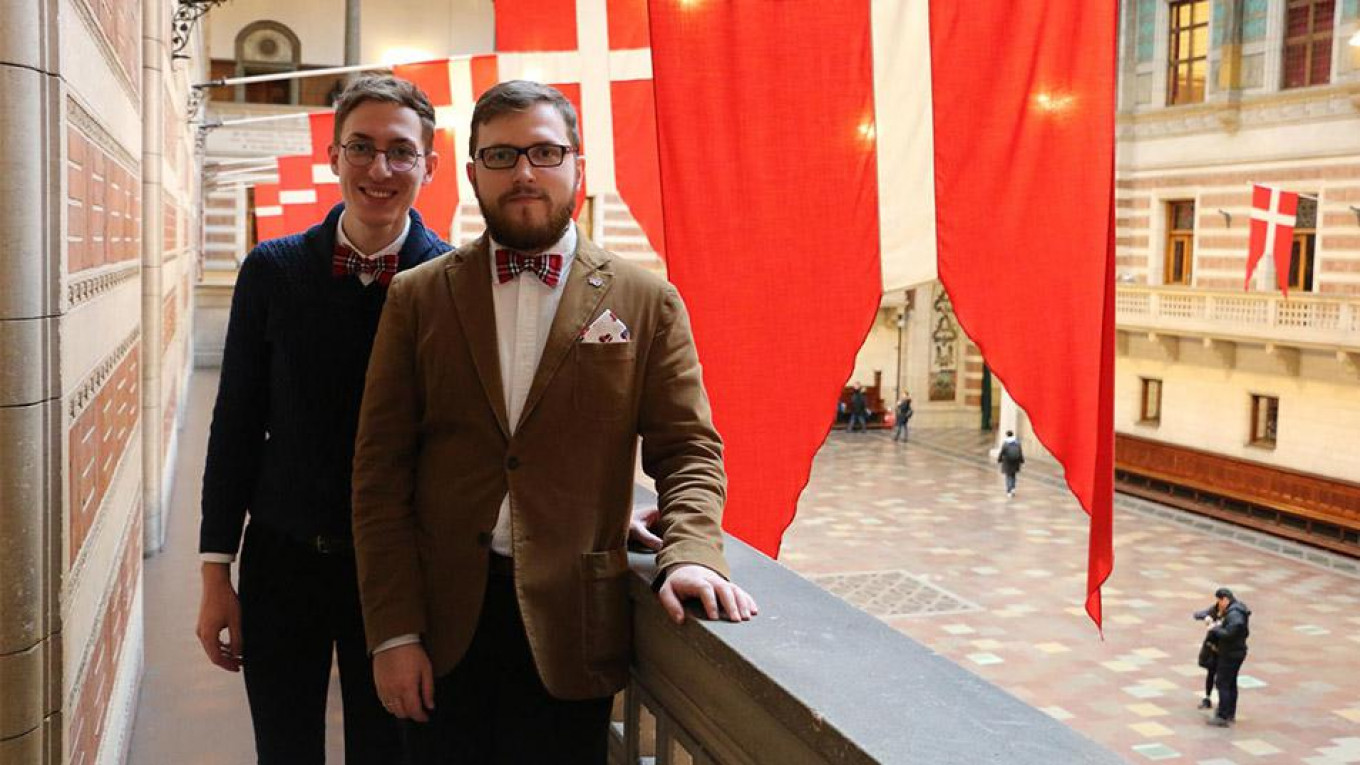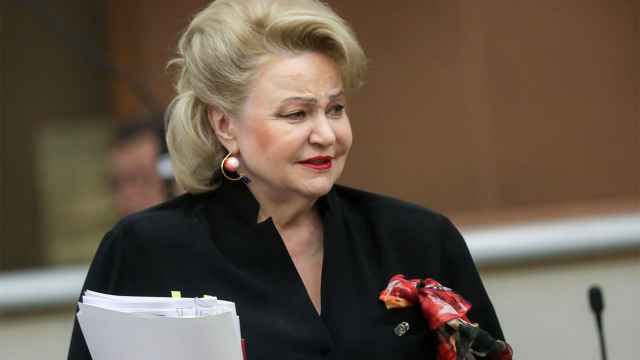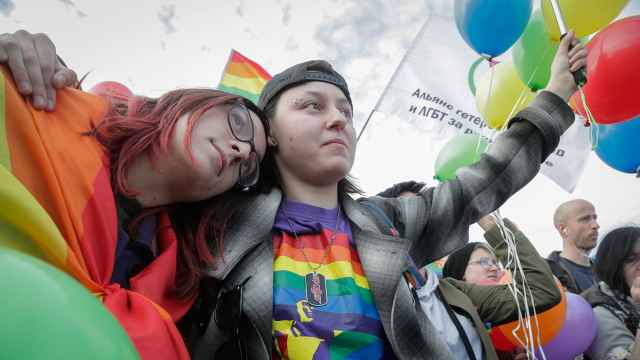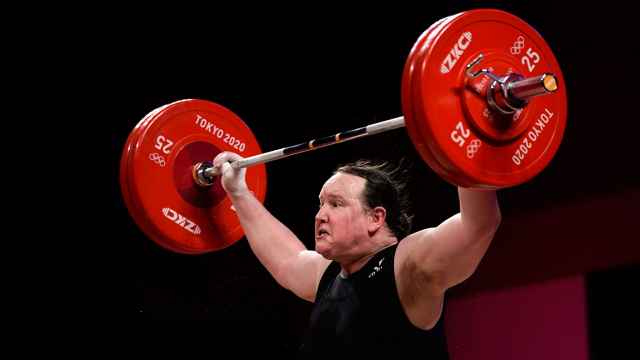It had seemed like a momentous event at first, a turning point for gay Russians. In retrospect, the man who helped bring the story to light wonders if it was worth sharing at all.
“No one could have predicted any of this,” Valery Pecheykin told The Moscow Times this week at the progressive Gogol Center theater in central Moscow, where he works. The playwright was still processing the events that led to his close friend and newly-wed husband fleeing the country the night before.
Days earlier, Pavel Stotsko, 28, and Yevgeny Voytsekhovsky, 27, had accidentally become the first officially recognized same-sex married couple in Russia. Their story, broadcast on state television, had returned the topic of gay marriage to the national conversation in a country where tolerance towards LGBT people has nosedived under President Vladimir Putin.
The saga began on the morning of Jan. 25 when the newlyweds went to a Moscow civil service center to register their marriage in Russia. They had tied the knot earlier in January in Copenhagen, where same-sex marriage is legal. Denmark is only a short flight from Russia and they were already in possession of the right visas, the couple explained in interviews with Russian media.
The doctor and medical student brought their marriage documents to the center, where an officer stamped them and, just like that, recognized their union. The whole affair took about five minutes, the couple said.
The ease with which their marriage was approved is difficult to grasp. Not only is gay marriage illegal in Russia; in 2013 the country passed a law against so-called “gay propaganda,” which makes it punishable for gay couples to kiss or carry a rainbow flag in the vicinity of minors. The law and accompanying rhetoric have buttressed homophobia in the country — a recent poll found that 83 percent of Russians find sex between people of the same genders to be “reprehensible.”
Pecheykin recalled he was in shock when his friend Stotsko called him and told him what had happened. But he quickly decided that this was something that “others should know about.” He contacted the opposition-leaning Dozhd TV channel, which invited the couple on air for an extensive interview. Later that day, the program’s host described their story as a “real victory.” Stotsko agreed.
“Russia officially accepts gay marriage,” he announced. “We did this not just for us, but for everyone who is scared to be gay in public.”
Technically, the recognition of the men’s marriage in Russia conformed with existing legislation. Russian family law does not explicitly define marriage as applying only to heterosexual couples. The country recognizes marriages registered abroad, as long as it is legally valid in the country where the marriage took place and the individuals are not related.
Nevertheless, the couple never expected their attempt to work. “We were in total shock,” Stotsko told the Dozhd host. “We were ready for a battle.”
The battle, however, was still to come. The day after their interview, the Rossia-24 state channel broadcast the story, quoting State Duma deputies who called the marriage a sham and demanded that the law be amended.
“[The marriage law] was written by normal people who didn’t take the dark nuances of international law into account,” said Vitaly Milonov, the deputy who introduced the original 2013 “gay propaganda” bill. He added that he intends to draft a new bill that explicitly prohibits same-sex marriage.
The Interior Ministry, for its part, fired the official who stamped the passports as well as her immediate supervisor.
On Saturday, police showed up at Stotsko’s apartment in Lyubertsy, a city in the Moscow region. They shut off electricity and internet access, demanded that the couple give up their marriage documents and refused to let them leave the apartment. If they did, the police informed their lawyers, the couple would be charged with resisting arrest.
The couple complied. But before the authorities left the apartment late that night, Igor Kochetkov, who heads the Russian LGBT Network, said they issued a veiled threat, saying they would not be able to protect the couple from homophobic violence.
Under a YouTube video of the Rossia-24 broadcast, Russians called for the couple’s heads. “Shoot them,” said one. “Burn them,” suggested another.
“The whole country had found out where they were living,” Kochetkov, who escorted the couple to the airport, told The Moscow Times. “There were threats online. I even received a threat from an anonymous caller.”
We did this not just for us, but for everyone who is scared to be gay in public.
Spooked, Stotsko and Voytsekhovsky decided to leave the country the next evening, without even saying goodbye to their parents in person. “I didn’t even get a chance to hug him,” Pecheykin said Stotsko’s mother told him later. The couple has not said which country they have traveled to and could not be reached for comment for this article.
“What else could they do?” Kochetkov said.
For Kochetkov, the episode is an important moment for gay Russians and an opportunity for society to have a discussion about gay rights. But not all activists agree.
Nikolai Alexeyev, who has been at the forefront of the gay rights movement for years, doesn’t believe the couple’s story will lead to concrete changes, even if it presents a positive moment for discussion. “We’ve already tried everything,” he told The Moscow Times.
The only avenue open to gay couples is the European Court of Human Rights, he said, where there already is a case pending of three Russian gay couples who were married abroad and are trying to have the unions recognized back home.
The court is expected to announce its decision in the next six months to two years, Alexeyev said.
“When that ruling is handed down, we can have a real discussion about the potential for gay marriage in Russia,” he said.
Alexeyev also dismissed the legal loophole as inconsequential, noting that Russian law is clear about its stance on gay marriage overall, even if it does not define marriage explicitly.
Тhis week at the Gogol Center, though, Pecheykin rebutted similar suggestions already circulating that his friend did not contribute to the gay rights cause. For him, Stotsko is nothing short of a hero.
“As a playwright, I can say that a hero in a drama is someone who takes on power that is much bigger than him alone,” Pecheykin said. “And that is exactly what happened here.”
A Message from The Moscow Times:
Dear readers,
We are facing unprecedented challenges. Russia's Prosecutor General's Office has designated The Moscow Times as an "undesirable" organization, criminalizing our work and putting our staff at risk of prosecution. This follows our earlier unjust labeling as a "foreign agent."
These actions are direct attempts to silence independent journalism in Russia. The authorities claim our work "discredits the decisions of the Russian leadership." We see things differently: we strive to provide accurate, unbiased reporting on Russia.
We, the journalists of The Moscow Times, refuse to be silenced. But to continue our work, we need your help.
Your support, no matter how small, makes a world of difference. If you can, please support us monthly starting from just $2. It's quick to set up, and every contribution makes a significant impact.
By supporting The Moscow Times, you're defending open, independent journalism in the face of repression. Thank you for standing with us.
Remind me later.







